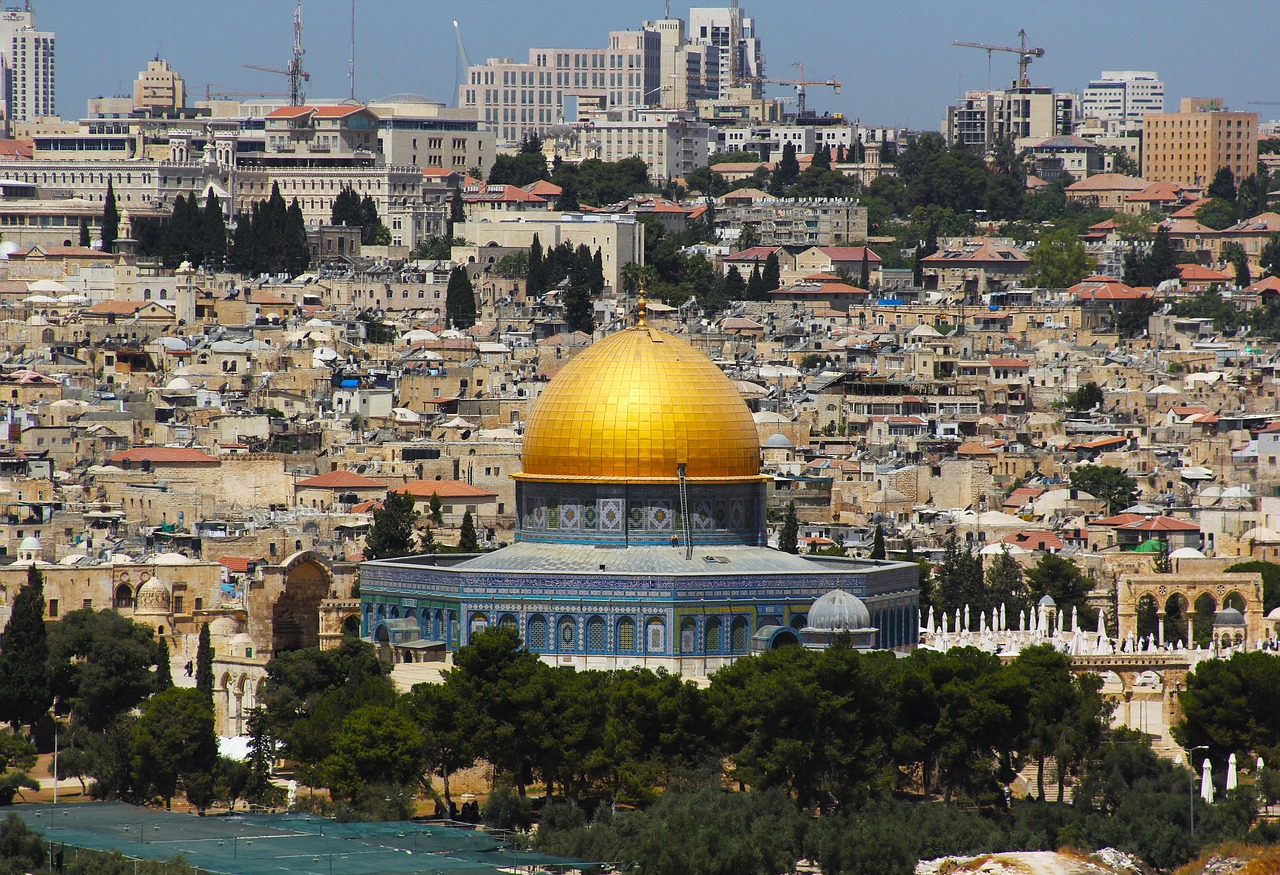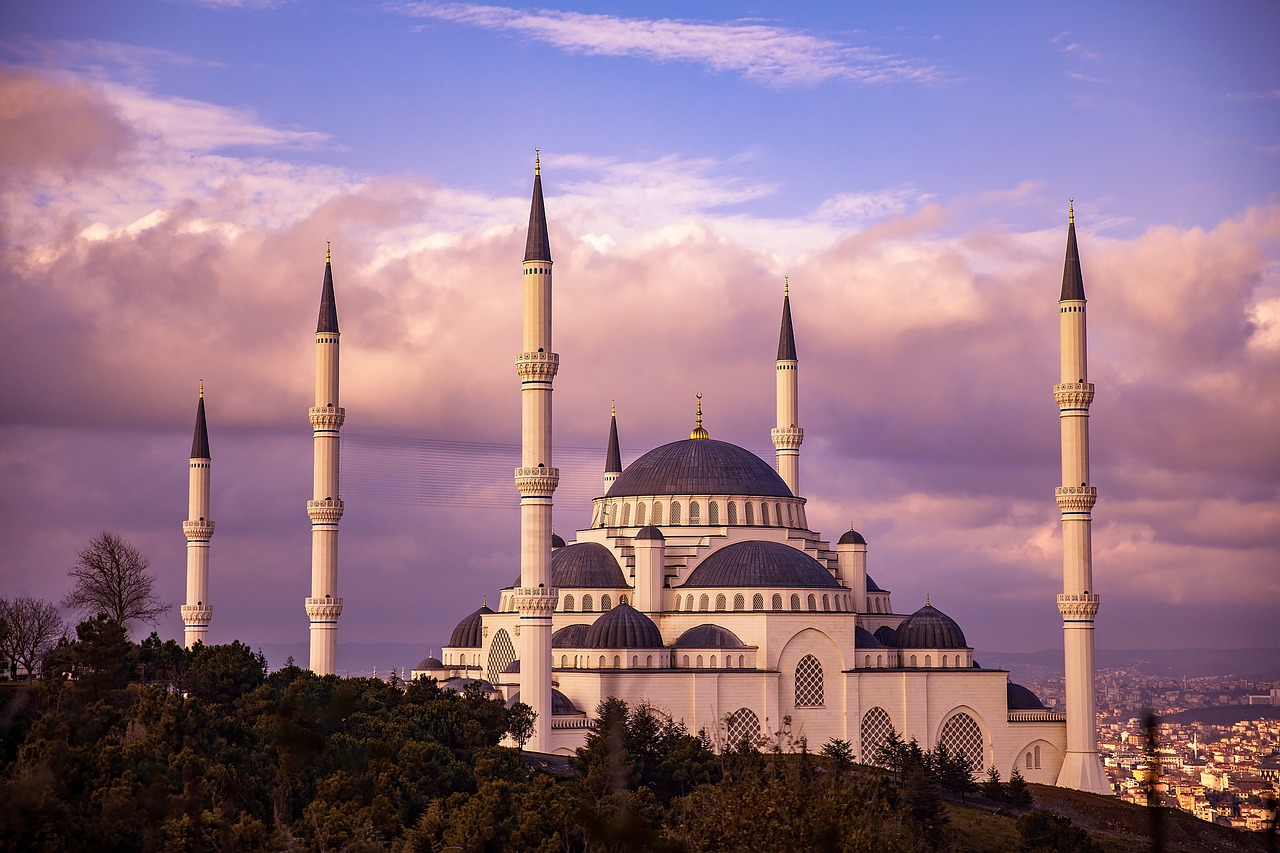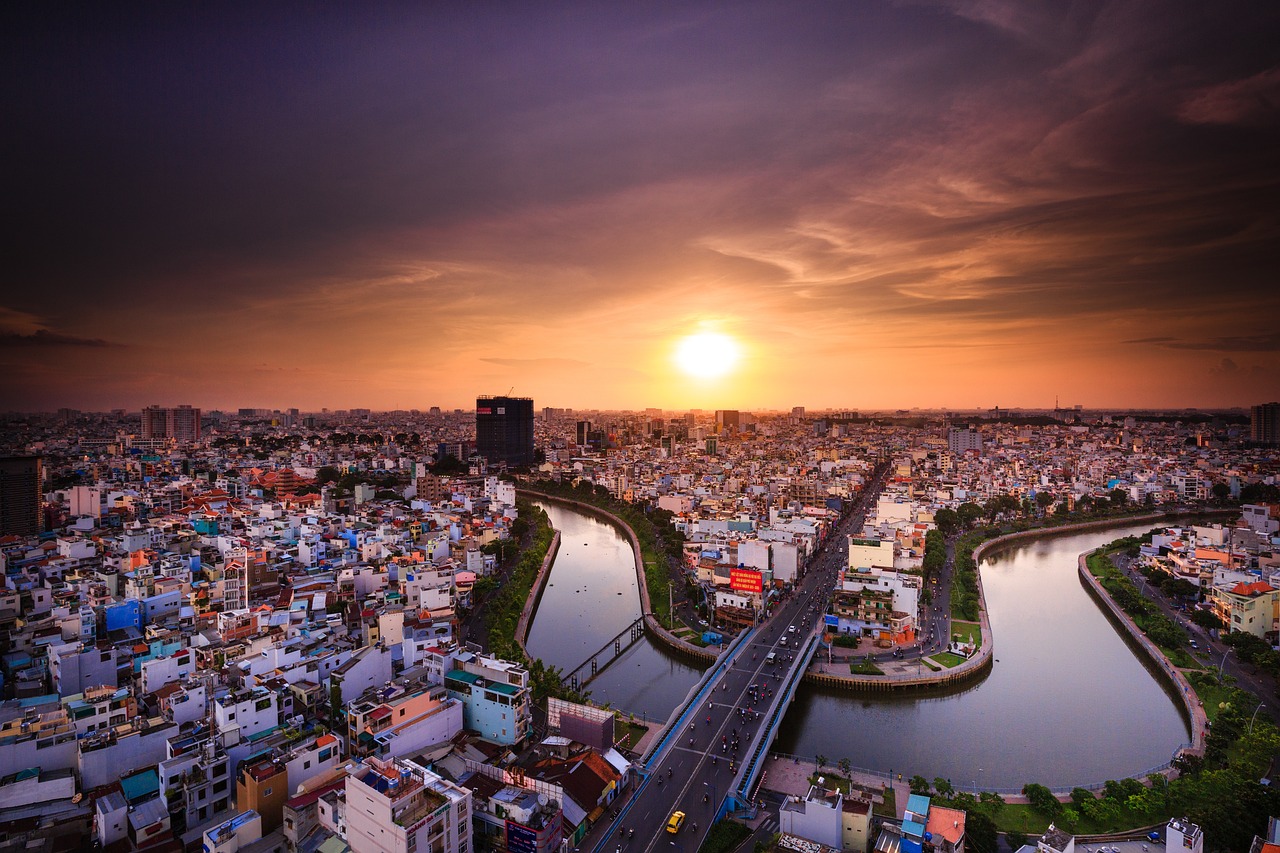Jerusalem is a city located in the Middle East, specifically in Israel. It is the capital of Israel and a holy city for Jews, Christians, and Muslims. The city is located on a plateau in the Judaean Mountains, between the Mediterranean Sea and the Dead Sea. It is considered one of the oldest cities in the world, with a rich history dating back thousands of years. Today, it is a vibrant and cosmopolitan city, known for its cultural and religious significance, as well as its diverse cuisine and vibrant markets.
Short History
Jerusalem has a rich and complex history dating back thousands of years. It has been ruled by a succession of empires and civilizations, including the Canaanites, Israelites, Assyrians, Babylonians, Persians, Greeks, Romans, Byzantines, Arabs, Crusaders, Ottomans, and British, among others.
For Jews, Jerusalem is considered the holiest city and the ancient capital of the Israelite Kingdom, where the First and Second Temples were located. It is also the site of the Western Wall, a remnant of the Second Temple, which is considered the holiest site in Judaism.
For Christians, Jerusalem is considered the site of Jesus’ crucifixion, burial, and resurrection, as well as the location of the Church of the Holy Sepulchre, one of the most important Christian pilgrimage sites in the world.
For Muslims, Jerusalem is considered the third holiest city after Mecca and Medina, and is home to the Dome of the Rock and Al-Aqsa Mosque, which are both located on the Temple Mount.
In modern times, Jerusalem has been the capital of the modern state of Israel since its establishment in 1948, and has been the focus of ongoing political and religious tensions between Israelis and Palestinians. Despite these challenges, Jerusalem remains a vibrant and culturally rich city, with a deep and complex history that continues to fascinate and inspire people from around the world.
Architecture
Jerusalem’s architecture is a blend of different styles and influences, reflecting its diverse and complex history. The city features a mix of ancient, medieval, and modern buildings, as well as religious and secular structures.
Some of the most iconic architectural landmarks in Jerusalem include the Old City, which is surrounded by ancient walls and features a mix of buildings and structures from different historical periods. Within the Old City, there are four quarters – Jewish, Christian, Muslim, and Armenian – each with its own distinct architectural style and features.
Other notable architectural landmarks in Jerusalem include the Western Wall, the Dome of the Rock, and Al-Aqsa Mosque, all of which are located on the Temple Mount and are considered important examples of Islamic architecture.
The modern part of Jerusalem also features a range of architectural styles, from Bauhaus and modernist buildings to more traditional and ornate structures. Some notable examples of modern architecture in Jerusalem include the Supreme Court Building and the Israel Museum.
Overall, Jerusalem’s architecture is a reflection of its complex and diverse history, with a mix of styles and influences that make it a unique and fascinating city to explore.
Museums and Galleries
Jerusalem is a city with a rich history and culture, and it is home to several world-class museums and galleries that showcase its unique heritage and traditions. Here are some of the most interesting museums and galleries in Jerusalem:
- Israel Museum – The largest cultural institution in Israel, featuring a wide range of exhibits and collections covering art, archaeology, and Jewish history.
- Yad Vashem – The world’s leading Holocaust museum and research center, dedicated to preserving the memory of the six million Jews who perished in the Holocaust.
- Bible Lands Museum – A museum dedicated to the history and culture of the ancient Near East, featuring exhibits and artifacts from the biblical period.
- Tower of David Museum – A museum located in the historic Tower of David, showcasing the history and culture of Jerusalem through interactive exhibits and multimedia presentations.
- Museum of Islamic Art – A museum dedicated to Islamic art and culture, featuring a wide range of artifacts and exhibits from across the Islamic world.
- Ticho House – A museum and cultural center located in a restored historic home, featuring a collection of art and artifacts related to Jerusalem’s cultural history.
- Bloomfield Science Museum – A museum dedicated to science and technology, featuring interactive exhibits and educational programs for visitors of all ages.
Jerusalem is a city with a rich and diverse cultural heritage, and its museums and galleries are a testament to its unique history and traditions. These institutions offer visitors a chance to explore and learn about the many facets of Jerusalem’s rich cultural and artistic legacy.
Landmarks and Monuments
Jerusalem is a city steeped in history and culture, and it is home to many iconic landmarks and monuments that are deeply meaningful to people around the world. Here are some of the most interesting landmarks and monuments in Jerusalem:
- Western Wall – The last remaining wall of the Second Temple, one of the holiest sites in Judaism.
- Dome of the Rock – A stunning Islamic shrine located on the Temple Mount, believed to be the site where the Prophet Muhammad ascended to heaven.
- Al-Aqsa Mosque – A sprawling mosque complex located on the Temple Mount, one of the holiest sites in Islam.
- Church of the Holy Sepulchre – A Christian pilgrimage site located in the Old City, believed to be the site of Jesus’ crucifixion and resurrection.
- Mount of Olives – A hill located just outside the Old City, featuring several historic churches and offering stunning views of Jerusalem.
- Tower of David – A historic citadel located in the Old City, now home to a museum and cultural center.
- Yad Vashem Holocaust Memorial – A powerful and moving tribute to the victims of the Holocaust, located just outside Jerusalem.
- Israel Museum – The largest cultural institution in Israel, featuring a wide range of exhibits and collections covering art, archaeology, and Jewish history.
Jerusalem is a city rich in cultural and religious significance, and its landmarks and monuments are a testament to its unique history and traditions. These sites offer visitors a chance to explore and learn about the many facets of Jerusalem’s rich cultural and religious heritage.
Parks and Green Spaces
Jerusalem is a city that is not only rich in history and culture, but also features several beautiful parks and green spaces that are worth visiting. Here are some of the most notable parks and green spaces in Jerusalem:
- Jerusalem Botanical Gardens – A sprawling garden featuring a wide range of plants and trees from Israel and around the world.
- Gan HaPa’amon – A historic park located in the heart of Jerusalem, featuring a fountain, playground, and a variety of trees and plants.
- Sacher Park – A large urban park located just outside the city center, featuring a playground, bike path, and a large pond.
- Wohl Rose Garden – A beautiful rose garden located in the heart of Jerusalem, featuring hundreds of varieties of roses.
- Liberty Bell Park – A popular park located in the center of the city, featuring a playground, basketball court, and a large bell sculpture.
- The Tisch Family Zoological Gardens – A sprawling zoo located just outside Jerusalem, featuring a wide range of animals from around the world.
- Ein Lavan – A natural spring located just outside Jerusalem, surrounded by beautiful hiking trails and a peaceful picnic area.
Jerusalem’s parks and green spaces offer visitors a chance to relax and unwind amidst the hustle and bustle of the city. Whether you’re looking to explore a beautiful garden or take a peaceful hike in the countryside, Jerusalem’s parks and green spaces have something to offer for everyone.
Shopping Districts
Jerusalem is a vibrant and cosmopolitan city that offers a diverse array of shopping options, from traditional markets to modern malls. Here are some of the most popular shopping districts in Jerusalem:
- Mahane Yehuda Market – A bustling outdoor market located in the heart of Jerusalem, featuring a wide range of food, clothing, and souvenir stalls.
- Mamilla Mall – A modern open-air shopping center located just outside the Old City, featuring high-end fashion brands and luxury boutiques.
- Ben Yehuda Street – A lively pedestrian street in the center of Jerusalem, featuring a mix of shops, cafes, and street vendors.
- Talpiot Industrial Zone – A sprawling commercial district on the outskirts of Jerusalem, featuring a wide range of stores and shopping centers.
- Malha Mall – A large indoor mall located in the southern part of the city, featuring a mix of international and local fashion brands, as well as a cinema and food court.
Jerusalem’s shopping districts offer visitors a chance to experience the city’s diverse and vibrant shopping culture, from the traditional markets and bazaars to the modern malls and shopping centers. Whether you’re looking for souvenirs, fashion, or local specialties, Jerusalem has something to offer for everyone.
Food and Drink
Jerusalem is a culinary melting pot, with a rich and diverse food culture that reflects its unique history and traditions. Here are some of the must-try foods and drinks in Jerusalem:
- Hummus – A classic Middle Eastern dip made from chickpeas, tahini, and lemon juice. Jerusalem is known for its delicious and creamy hummus, which is typically served with fresh pita bread.
- Falafel – Another classic Middle Eastern dish, falafel is made from ground chickpeas or fava beans, shaped into balls or patties, and fried until crispy. It’s often served in a pita pocket with salad, tahini sauce, and pickles.
- Shawarma – A popular Middle Eastern street food, shawarma is made from sliced meat (usually chicken or lamb) that has been marinated and grilled on a rotating spit. It’s often served in a pita pocket with salad, pickles, and tahini sauce.
- Jerusalem Bagel – A soft, doughy bagel-like bread that is shaped like a ring and topped with sesame seeds. It’s often served warm and fresh from the oven, and is a popular breakfast or snack food in Jerusalem.
- Israeli Salad – A refreshing and healthy salad made from chopped tomatoes, cucumbers, onions, and parsley, dressed with olive oil and lemon juice. It’s a staple side dish in many Jerusalem restaurants.
- Arabic Coffee – A strong, spiced coffee that is typically served in small cups with dates or other sweets. It’s a popular drink in Jerusalem’s traditional markets and cafes.
- Israeli Wine – Israel has a growing wine industry, and Jerusalem is home to several wineries and tasting rooms where visitors can sample local wines.
Overall, Jerusalem’s food culture is diverse, delicious, and reflective of its unique history and traditions. From street food to fine dining, there’s something for everyone in this vibrant and cosmopolitan city.
Transportation
Jerusalem is a relatively compact city, and many of its most popular attractions are located within walking distance of each other. However, there are also several other transportation options available for visitors who want to get around more quickly or cover more ground. Here are some of the best ways to move around Jerusalem:
- Walking – As mentioned, many of Jerusalem’s main attractions are located within walking distance of each other, and walking is a great way to explore the city’s narrow streets and historic neighborhoods.
- Public Transportation – Jerusalem has a network of buses and light rail trains that connect all parts of the city. The light rail system is particularly convenient for visitors, as it runs through the city center and stops at many popular tourist sites.
- Taxis – Taxis are widely available in Jerusalem and are a good option for visitors who want to travel more quickly or have a specific destination in mind. Most taxis in Jerusalem are metered, but it’s always a good idea to confirm the price with the driver before getting in.
- Bike Rentals – Jerusalem has a growing network of bike rental stations, and cycling is a great way to explore the city’s parks and green spaces. There are also several bike tours available that offer guided rides through the city.
- Car Rentals – For visitors who want to explore Jerusalem’s surrounding areas or travel outside the city, car rentals are available from several major companies. However, it’s important to note that driving in Jerusalem can be challenging due to the city’s narrow and winding streets.
Jerusalem has several convenient and affordable transportation options available, making it easy for visitors to explore this historic and fascinating city.
City Safety
Jerusalem is generally a safe city for visitors, and incidents of violent crime are relatively rare. However, it is important for visitors to exercise caution and be aware of their surroundings, particularly in crowded areas or busy tourist sites.
There have been sporadic incidents of political and religious tensions in Jerusalem, particularly in the Old City and surrounding areas. Visitors are advised to avoid any political demonstrations or rallies, and to be respectful of the city’s religious and cultural sensitivities.
It is also recommended to avoid walking alone in isolated areas, particularly at night, and to keep valuables such as passports and wallets secure at all times.
While Jerusalem is generally a safe city for visitors, it’s important to take basic safety precautions and exercise common sense while exploring this vibrant and fascinating destination.
Expensive or Cheap
Jerusalem can be a relatively expensive city for visitors, particularly when it comes to accommodations and dining. However, there are also many budget-friendly options available for those who are willing to do some research and plan ahead.
Here are some general price ranges for common expenses in Jerusalem:
- Accommodations: Prices for hotels and hostels in Jerusalem can vary widely depending on the location and quality of the accommodation. Budget options such as hostels and guesthouses can start at around $20-30 per night, while more upscale hotels can cost upwards of $150-200 per night.
- Dining: Restaurants in Jerusalem can be relatively expensive, particularly in the more touristy areas. However, there are also many affordable options available, such as street food and market stalls. A budget meal at a local restaurant can cost around $10-15 per person, while a more upscale meal can cost upwards of $30-50 per person.
- Transportation: Public transportation in Jerusalem is relatively affordable, with a single bus or light rail ride costing around $1-2. Taxis can be more expensive, with fares starting at around $4-5 and increasing depending on the distance.
- Attractions: Many of Jerusalem’s main attractions, such as the Old City and religious sites, are free to visit. However, some museums and other cultural attractions may charge admission fees, which can range from $5-15 per person.
Overall, while Jerusalem can be an expensive city for visitors, there are also many budget-friendly options available for those who are willing to do some research and plan ahead.
Best Time to Travel
The best time to visit Jerusalem depends on individual preferences and interests, as well as the climate and seasonal events in the city. Here are some things to consider when deciding on the best time to travel to Jerusalem:
- Climate: Jerusalem has a Mediterranean climate with hot summers and cool winters. The summer months of June through August can be very hot, with temperatures often exceeding 90 degrees Fahrenheit. The winter months of December through February can be cool and rainy, with occasional snowfall. The spring and fall months of March through May and September through November, respectively, tend to have mild temperatures and less rain.
- Religious Holidays: Jerusalem is an important religious destination for Jews, Christians, and Muslims, and several important religious holidays are celebrated in the city throughout the year. Visitors who are interested in experiencing these celebrations may want to plan their trip accordingly.
- Tourist Season: Jerusalem can be a busy tourist destination year-round, but peak tourist season tends to be in the summer months of June through August, as well as during major holidays such as Passover and Christmas. Visitors who prefer to avoid crowds may want to consider traveling during the shoulder seasons of spring and fall.
The best time to travel to Jerusalem depends on individual preferences and interests. Visitors who are interested in experiencing the city’s religious and cultural events may want to plan their trip around these celebrations, while those who prefer mild weather and fewer crowds may want to consider traveling in the spring or fall.
Date Ideas
Jerusalem offers a wealth of romantic and cultural date ideas for couples to explore. Here are some suggestions for a memorable date in Jerusalem:
- Watch the Sunset from the Mount of Olives – A romantic spot to watch the sunset over the city with panoramic views.
- Visit the Mahane Yehuda Market – Stroll through this bustling market and sample local food and drinks.
- Take a Walking Tour of the Old City – Explore the narrow alleyways and historic sites of Jerusalem’s Old City.
- Picnic in the Jerusalem Botanical Gardens – Enjoy a romantic picnic in the lush surroundings of the Jerusalem Botanical Gardens.
- Watch a Movie at the Cinematheque – Catch a movie at the Jerusalem Cinematheque, which features a variety of international and independent films.
- Take a Hot Air Balloon Ride – Soar above the city and enjoy breathtaking views of Jerusalem and its surroundings.
- Visit the Tower of David Museum – Explore the rich history of Jerusalem at this fascinating museum housed in a historic fortress.
- Attend a Concert or Performance – Enjoy a night out at one of Jerusalem’s many cultural venues, such as the Jerusalem Theater or the Yellow Submarine music club.
- Take a Wine Tasting Tour – Sample local wines and learn about Israel’s growing wine industry on a guided tour of one of Jerusalem’s wineries.
- Walk the Ramparts – Take a romantic walk along the ancient city walls of Jerusalem and enjoy stunning views of the city.
Jerusalem offers a wealth of cultural and romantic date ideas for couples to explore, from exploring the historic Old City to sampling local food and wine. Whether you’re looking for a quiet and intimate evening or an adventurous day out, Jerusalem has something to offer for every couple.
Fun and Interesting Facts
Jerusalem is one of the world’s oldest and most historically significant cities, and has a rich cultural and religious heritage that draws millions of visitors every year. Here are some fun and interesting facts about Jerusalem:
- Jerusalem is considered a holy city by three major world religions: Judaism, Christianity, and Islam.
- The city is home to the Western Wall, one of the holiest sites in Judaism, and the Dome of the Rock, an important site in Islam.
- Jerusalem’s Old City is divided into four quarters: Jewish, Christian, Muslim, and Armenian.
- The city has been destroyed and rebuilt multiple times throughout its history, and has been ruled by various empires and powers, including the Romans, Ottomans, and British.
- Jerusalem is home to several world-renowned cultural institutions, such as the Israel Museum, the Yad Vashem Holocaust Memorial, and the Jerusalem Theater.
- The city is known for its distinctive architecture, which blends a variety of styles from different periods in its history.
- Jerusalem has a thriving food scene, with a variety of traditional and modern restaurants, street food stalls, and markets.
- The city is home to several annual cultural events and festivals, such as the Jerusalem Film Festival, the Jerusalem Book Fair, and the Festival of Light.
- Jerusalem has been designated a UNESCO World Heritage Site for its cultural and historical significance.
- The city is surrounded by beautiful natural landscapes, including the Judean Mountains and the Dead Sea.
In conclusion, Jerusalem is a unique and fascinating city with a rich and diverse cultural heritage. From its religious significance to its vibrant food and arts scenes, there is always something new and interesting to discover in this ancient and vibrant city.



